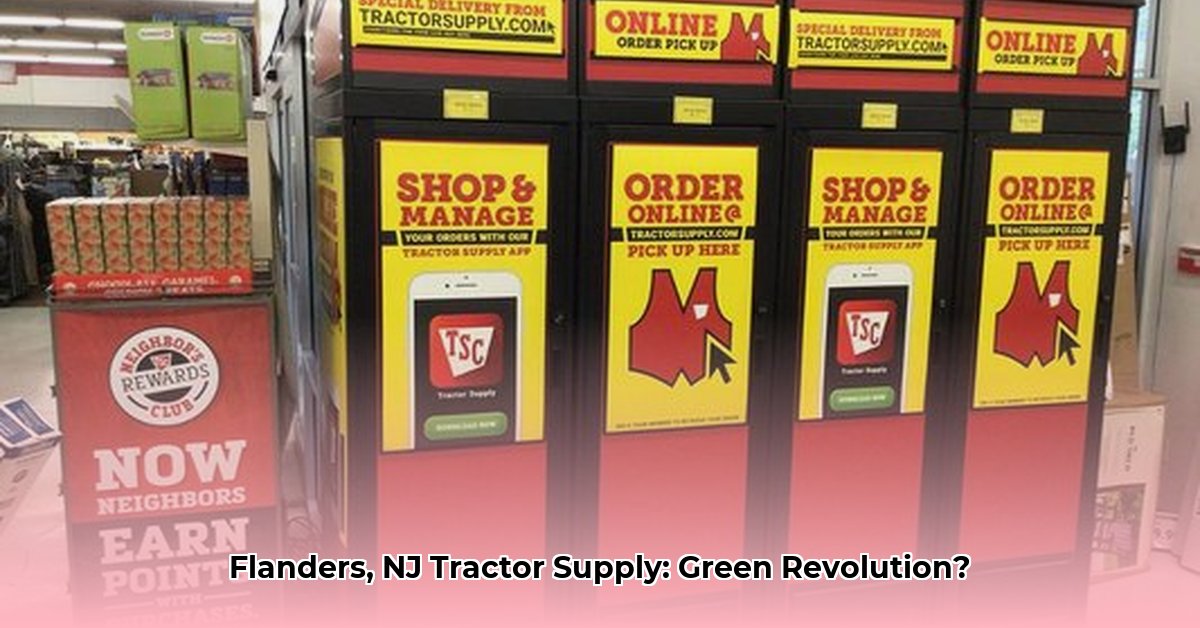
Tractor Supply's Potential Role in Flanders, NJ Sustainable Agriculture
Tractor Supply Company (TSC) holds a prominent position in many rural communities, including Flanders, New Jersey. Its potential contribution to sustainable agriculture in the region is a subject worthy of investigation. While TSC offers a wide array of products—seeds, fertilizers, tools, and equipment—essential for farming, a comprehensive assessment of its impact on sustainable practices requires further data. Crucially, details regarding the sourcing of these products and TSC's commitment to eco-friendly initiatives are currently lacking. This article explores the potential benefits and challenges, highlighting the need for collaborative action to promote sustainable farming in the Flanders area. For more information on TSC's community involvement, see their donation request page.
Tractor Supply's Potential Contributions: An Unclear Picture
TSC could significantly contribute to sustainable agriculture in Flanders. The potential exists through the provision of sustainable inputs like organic seeds and compost-based fertilizers, and tools and equipment that minimize environmental impact. However, the absence of detailed information on the specific products offered by the Flanders store prevents a definitive assessment. Do they prioritize organic options? Are their fertilizers sustainably produced? Without concrete data, we can only speculate on the extent of their contribution. This uncertainty necessitates further investigation to determine TSC's actual impact.
Challenges and Unknowns: The Need for Transparency
A significant obstacle in evaluating TSC's role is the lack of publicly available information regarding their commitment to sustainable practices. Key questions remain unanswered: What percentage of TSC's products are sustainably sourced? Does the company actively partner with local farms employing environmentally conscious methods? Do they actively educate customers on sustainable farming techniques? The absence of answers to these questions underscores the urgent need for greater transparency from TSC and a more thorough investigation into their operations. This lack of data makes it difficult to gauge their true impact on the local farming community.
Stakeholder Analysis: Collaborative Action for Sustainability
The realization of TSC's potential to promote sustainable agriculture in Flanders necessitates collaboration among various stakeholders. Each group has a vital role to play in fostering a more sustainable farming future. We outline concrete actions for each stakeholder below:
Farmers: Initiate direct inquiries with TSC concerning their sourcing practices; explore alternative suppliers for sustainable products; actively advocate for increased transparency from TSC regarding their sustainability efforts.
Tractor Supply: Publicly disclose detailed information about the sourcing of their products; actively partner with local organizations dedicated to sustainable agriculture; offer educational workshops to farmers on sustainable farming techniques.
Rutgers Cooperative Extension: Conduct research on the environmental impact of TSC's offerings; provide farmers with educational resources promoting sustainable practices; facilitate partnerships between TSC and local sustainable farmers.
Local Government: Implement procurement policies prioritizing sustainable products; incentivize TSC and other businesses to embrace sustainable practices; invest in infrastructure that supports sustainable agriculture, such as compost collection programs.
Call to Action: Promoting Sustainable Agriculture in Flanders
The potential for Tractor Supply to positively impact sustainable agriculture in Flanders is significant, but realizing this potential requires concerted, collaborative action. This call to action emphasizes the importance of transparency, research, and collective effort:
- Demand Transparency: Farmers and consumers should directly inquire about Tractor Supply’s sustainability practices.
- Invest in Research: Rutgers Cooperative Extension should conduct thorough research on the environmental impact of local businesses.
- Foster Collaboration: Local government should encourage partnerships between farmers, businesses like TSC, and extension services.
Conclusion: A Shared Responsibility for a Sustainable Future
The role of Tractor Supply in supporting sustainable agriculture in Flanders, NJ remains largely undefined due to a lack of readily available data. While the potential for positive impact is evident, realizing this potential requires a collective effort from all stakeholders. Greater transparency from TSC, active engagement from local farmers, and supportive policies from local government are essential steps towards building a more sustainable agricultural future for Flanders. By working together, we can create a system where both economic prosperity and environmental stewardship thrive.